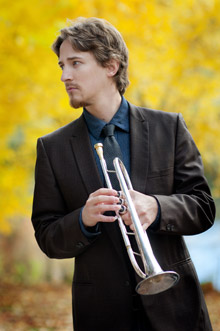
WELL ROUNDED Daniel Rosenthal’s album is marked by adventurous writing — and beautiful playing |
Trumpeter Daniel Rosenthal's Lines (American Melody) is one of those little gems of an album that comes along with regularity from Boston's indie-jazz scene. It has the bright clarity and burbling flow of a mountain spring — it even includes some of the country-ish signifiers that phrase suggests.
>> READ: "More jazz to catch live" by Jon Garelick <<
The set-up is as spare as can be: Rosenthal on trumpet and flugelhorn, Rick Stone on alto, bassist Kendall Eddy, drummer Austin McMahon and, on four of the 12 tracks, banjo player Wes Corbett, from neo-bluegrass outfit Joy Kills Sorrow. The tracks without Corbett most readily conjure other "piano-less" quartets, like the early Ornette Coleman and Gerry Mulligan-Chet Baker bands, with their lucid counterpoint and, at least in Coleman's case, ambiguous harmonies. In fact, the opener, Rosenthal's "Subo," is a conscious nod to an Ornette-style calypso. Here and on other numbers, the relaxed interplay between Rosenthal and Stone moves from solos to two-line counterpoint to unison themes, all with understated ease. The two here seem like halves of the same heart — creating lines that dart and pause, extended clusters of fast notes, long-toned arcs.
Stone, most familiar these days from the madcap antics of the Quartet of Happiness, shows a different side of himself here, an almost Konitz-like grace. Rosenthal's lines are so interesting that he gets you to focus more on what he's playing than on how (is he more like Chet Baker here? Don Cherry there?), until he releases a pearl-like string of notes, his rhythmic articulation a lesson in swing all by itself.
"Dan's playing sounds so effortless and elegant," says Russ Gershon, who is Rosenthal's boss in the Either/Orchestra, "that on first encounter you might not realize how many interesting ideas he's putting out there, at least until he cannily leads you up to the edge — or over it."
Rosenthal likes to play with form — whether it's the tight structures of "Subo" or of Thelonious Monk ("Reflections," "Skippy"), or his own longer forms. He has a taste for writing extended melodic developments that might defer solo improvisation. In that regard — and in the use of banjo, and in the long-lined, pastoral chug and clink of the album's title track — he's similar to Jeremy Udden (a former Either/Orchestra bandmate).
" [The song] 'Lines' is slightly influenced by Jeremy," Rosenthal allows when I get him on the phone. Grabbing the score for me, he says the piece is "two pages long, in five sections, with no repeats" — 29 bars, then 22, then 18, and two of 14. "I didn't set out to write a long form, that's just the way it came out, the way I heard it in my head."
As for the banjo, Rosenthal comes by it honestly — his dad is Phil Rosenthal, formerly of Grammy-nominated progressive bluegrass band the Seldom Scene, and Daniel has always liked the "metal on metal sound" of trumpet with banjo. "My parents are into folk and bluegrass, and that's all they had in the house." Nonetheless, he heard Louis Armstrong soon after he took up trumpet in grade school, and his path was set.
At the Lily Pad, Rosenthal will be joined by Stone, saxophonist Charlie Kohlhase, guitarist Andrew Stern, bassist Jef Charland, and drummer Luther Gray, with perhaps a couple of more guests, in preparation for Rosenthal's next album, which he anticipates will be "more avant-garde" than Lines. But don't think that indicates a set path — he's also planning a bluegrass album with his dad.